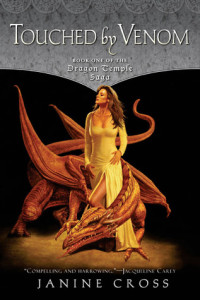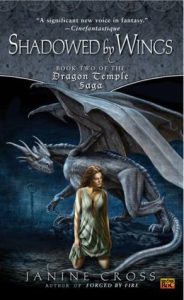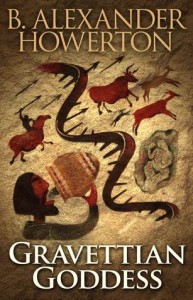 Author, B. Alexander Howerton sent me an e-copy of his novel Gravettian Goddess. I’ve also seen it on the KDP free list.
Author, B. Alexander Howerton sent me an e-copy of his novel Gravettian Goddess. I’ve also seen it on the KDP free list.
Description from Goodreads:
What if the Holy Grail were real? What if people could truly live forever? Gravettian Goddess will appeal to fans of both The Da Vinci Code and Clan of the Cave Bear. It is the story of Greg Janeszco, a self-made internet multi-millionaire with a penchant for archaeology, who discovers a mystery that reaches back into the dim mist of prehistory, when humans first migrated into Europe at least 40,000 years ago during the ice age and created the wondrous cave paintings found there. Can he solve the ancient riddle before the pursuing members of a shadowy international organization, who want to exploit the find for their own dark purposes?
Review: ***spoiler alert***
This book has a truly interesting idea and, I think, an honorable aim. It should be stated up front that I appreciate that about it and the right reader will probably find a lot of worthwhile information and an interesting story here. This is important to state up-front, because I obviously was not the right reader. I intend to spend a page or so detailing, in excruciating detail, why not and I don’t want it to come across as an attack. I’m not pulling any punches, but I’m not trying to be mean.
I recognise and give credence to the fact that others love this book. I didn’t, which was surprising to me. I’d have thought this would be right up my alley. My first degree was anthropology, with minors in archaeology and religious studies. So, I obviously have an interest in the subject area. But no, despite being right in the middle of my interest grid, this book didn’t do it for me. It is possible that same educational history made much of this book redundant to me and affected my enjoyment of it, since there is A LOT of theory presented here in a rather academic mien.
The book begins with a number of solid and, frankly, annoying textbook-like info-dumps, broken up by a number of characters’ history info-dumps. In fact, I’d say the 1st 25% is pretty much ALL info-dumps, back to back. It got repetitive quickly. (However, I’ll acknowledge that if you know nothing about human evolution and migrations or the various cultures that revered the Mother Goddess, this might be riveting for you. It’s an interesting topic after all.)
Further, many of the historical info-dumps resulted from a convenient knowledge gap on Greg’s part. He’s a Ph.D. level student of archeology at a renowned school. Even if he did focus on underwater archaeology, much of what he needs explained to him (for the benefit of the reader) would be undergraduate anthropology 201 level stuff. He should know it and it felt artificial that he didn’t.
As the book progressed and the guise of a mystery was dropped all together, the info-dumps morphed into actual lectures. I didn’t particularly enjoy this, nor did I find their flow particularly natural. As an example, Greg repeatedly attempted to interject humanist objections about the interpretations of pre-historic mythology. This simply came across as scripted attempts to pre-emptively counter some ethereal social arguments.
At one point he questioned if the Venus of Willendorf figure is actually just an early form of degrading sexism and objectification of women instead of a representation of the divine. It felt very much like he did this just so that Malenka could then lecture him on the dangers of assigning our value set to other cultures. This is an important anthropological lesson and true, but its inclusion at this point in the story (in a conversation between four anthropologists who shouldn’t need it in the first place) felt forced, as if part of some ulterior motive.
It’s this ulterior motive that really irked me in the end. The book is initially presented as a bit of a mystery. Comparisons to Dan Brown are made and the first couple chapters set it up to be of a similar sort of book. Then that mystery is dropped completely! In fact, both the man Greg is seeking and the woman who prompted him to action and joined him on the search die—no more action/adventure mystery. What’s left is Greg’s transformative experience with the Great Earth Goddess. This is the focus of the book!
All that mystery preamble feels like a bait and switch to get you into the lessons on the sacred feminine. Don’t get me wrong, I’m a fan of the Goddess, but I don’t like sneak proselytising from her followers any more than I do when the Jehovah witnesses knock on my door at 8:00 Saturday morning. I don’t know that the author meant the book to feel like this (or even if he’s an actual follower), but it did.
For the most part, I found the writing perfectly passable, but there were times that it fell apart. Names and endearments were used too frequently in dialogue to feel normal. Some descriptions were painfully over-detailed and there were a number of run-on, or extreme compound sentences. (Just read the first in the book for an example.)
While the technical writing was fine, the book is quite repetitive. The reader is told “Greg awoke,’ or some variation of it about 4,000 times. Similarly we’re given some form of ‘an indeterminate amount of time passed’ another 4,000 times, or so. This was noticeable both in it’s repetition and because the information was often irrelevant. If Greg is off doing something, anything, he’s obviously woken up.
Additionally, both Dr. Tillmans, Zorian and Ellsington all teach in the exact same manner, by asking “are you sure’ whenever Greg regurgitates ‘common knowledge.’ It became an obvious ploy to force the reader to consider their own opinions on the matters in question and, hopefully, see the error of their ways. But seeing four seperate people pulling the same schtick again and again didn’t feel believable. In fact, I got down right annoyed at it. It came across as incredibly arrogant. A number of the questions they highlight are worth consideration, however.
There was also very little character development. The bad guys are wholly evil, lacking any redeeming qualities (including basic sanity, apparently) while the good guys are saints. You’d think none of them even ever woke up grumpy. These extreme dichotomies were disconcerting. As was the fact that Greg, a 30-year-old American man, was a touchy-feeling, huggy, crier, who even fainted at one point. How many men do you know like that?
I generally like a little romance in a book, but here I don’t think it contributed to the story. If there had been a single strong connection, it might have. Instead, Greg meets and within a couple days falls in love with Eleni, judging by how he grieved for her when she died a week later. A few (conscious) days after that, he meets and immediately falls in love with Alaia. By dint of their mere replaceability, these relationships seem transient and unimportant, though they aren’t meant to. The time dedicated to shining eyes, swaying hips, blinding smiles, etc (not to mention sex) only distracted the reader amidst an already flagging plot. It didn’t have room for such detractions.
Lastly, I see from the previous reviews (and the author’s responses to them) that the book has taken a lot of flack for it’s/the character’s critical treatment of Dan Brown’s work (surprising since the author chose to site him as a comparable read). I highlighted a number of these passages without realising this. My issue, however, was not any kind of offence on Brown’s behalf or indignation at one author slamming another, more well-known author, in his work. No, mine was a much more personal complaint. I hate, HATE seeing these kinds of pop references in books (if pop reference if the right phrase for it).
When characters say things like, “Whoa, this is too much. It’s almost like we’re living through the Da Vinci Code or something,” no matter the source material, I groan. I just hate it. To me it only highlights the improbability of a plot by pointing out that it resembles a well know fictional account. Why would I want that? I want to FORGET that it’s fiction and impossible so that I can immerse myself in it. Totally personal, that, but still.
So, again, there is an interesting kernel of an idea here. It’s obvious that the author did a lot of research before writing the book. He ties a number of different cultures together in a considerable way. Some people will no doubt enjoy the hell out of it. As for me…if you’re interested in the Goddess Cultures portrayed in this novel, I’d recommend skipping the attempt at fiction and just reading Baring & Cashford’s The Myth of the Goddess: Evolution of an Image.
…and that, my friends, is a 1,300-word review….
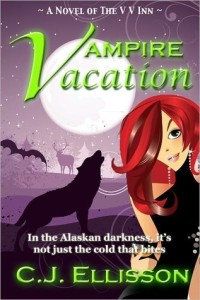 I picked up C. J. Ellisson‘s book, Vampire Vacation, from the KDP free list. It’s still free…probably perma-free.
I picked up C. J. Ellisson‘s book, Vampire Vacation, from the KDP free list. It’s still free…probably perma-free.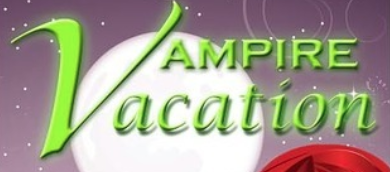

 Author,
Author, 
